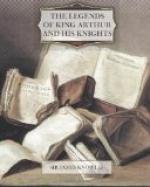And when he had overrun the whole province with his arms, and reduced it everywhere to subjection, he returned again to Britain, and held his court at Caerleon, with greater state than ever.
Anon he invited thereto all the kings, dukes, earls, and barons, who owed him homage, that he might treat them royally, and reconcile them to each other, and to his rule.
And never was there a city more fit and pleasant for such festivals. For on one side it was washed by a noble river, so that the kings and princes from the countries beyond sea might conveniently sail up to it; and on the other side, the beauty of the groves and meadows, and the stateliness and magnificence of the royal palaces, with lofty gilded roofs, made it even rival the grandeur of Rome. It was famous also for two great and noble churches, whereof one was built in honour of the martyr Julius, and adorned with a choir of virgins who had devoted themselves wholly to the service of God; and the other, founded in memory of St. Aaron, his companion, maintained a convent of canons, and was the third metropolitan church of Britain. Besides, there was a college of two hundred philosophers, learned in astronomy, and all the other sciences and arts.
In this place, therefore, full of such delights, King Arthur held his court, with many jousts and tournaments, and royal huntings, and rested for a season after all his wars.
And on a certain day there came into the court a messenger from Ryence, King of North Wales, bearing this message from his master: That King Ryence had discomfited eleven kings, and had compelled each one of them to cut off his beard; that he had trimmed a mantle with these beards, and lacked but one more beard to finish it; and that he therefore now sent for King Arthur’s beard, which he required of him forthwith, or else he would enter his lands and burn and slay, and never leave them till he had taken by force not his beard only, but his head also.
When King Arthur heard these words he flushed all scarlet, and rising in great anger said, “Well is it for thee that thou speakest another man’s words with thy lips, and not thine own. Thou hast said thy message, which is the most insolent and villainous that ever man heard sent to any king: now hear my reply. My beard is yet too young to trim that mantle of thy master’s with; yet, young although I be, I owe no homage either to him or any man—nor will ever owe. But, young although I be, I will have thy master’s homage upon both his knees before this year be past, or else he shall lose his head, by the faith of my body, for this message is the shamefullest I ever heard speak of. I see well thy king hath never yet met with a worshipful man; but tell that King Arthur will have his head or his worship right soon.”
Then the messenger departed, and Arthur, looking round upon his knights, demanded of them if any there knew this King Ryence. “Yea,” answered Sir Noran, “I know him well, and there be few better or stronger knights upon a field than he; and he is passing proud and haughty in his heart; wherefore I doubt not, Lord, he will make war on thee with mighty power.”




